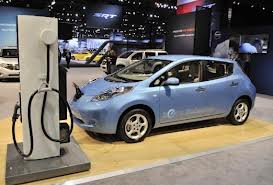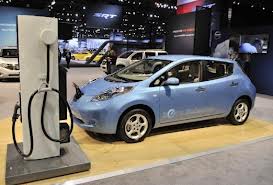
California is witnessing a unique battle of sorts among auto markers.
In a bid to woo away green car buyers from Tesla Motors Inc, the battery electric vehicle leader, the Asian automakers are opening up a new front in the contest to define the future of cars.
To tout new fuel-cell cars, Asian car makers Toyota, Honda and Hyundai used the opening days of the Los Angeles auto show. Thousands of thousands of car enthusiasts are drawn to this auto show in the US, one of the world's richest vehicle markets.
The cars that were showcased at the show use alternative fuel run on hydrogen and creates electricity in a process that does not produce carbon dioxide. Although in a limited manner, automakers plan to offer these cars in California.
While Toyota says it has received expressions of interest from more than 2,000 people, Hyundai says it has already leased its fuel-cell Tucson to about 85 customers. Honda however said that it Clarity sedan will only be available in late 2016.
One of the shortcomings for fuel-cell technology is that they are expensive and hydrogen fueling stations are still rare. Therefore Hyundai's Tucson can be leased for $499 per month and sold only in Southern California, where there are about nine fueling stations.
Bill Fay, general manager for Toyota brand sales in the United States stressed that a concerted public-private push is needed to build more refueling stations. Toyota's new Mirai can run for 300 miles between charges.
"We need the government to support the investment in this and we hope that Honda and Hyundai will be coming in and provide some support," Fay said.
"Then I think we have some critical mass to build from and take off from there," he added.
As much as $100 million a year is provided by California to fund alternative fuel and vehicle projects, including hydrogen refueling stations.
However there has been strict criticism of the fuel cells and the tax-funded subsidies used to promote them by Tesla Chief Executive Elon Musk and other Tesla executives. Fuel cell vehicles compete with Tesla's electric cars as generators of credits that could help conventional automakers meet California's complex zero emission vehicle quotas.
Tesla has benefited from, and repaid, government loans. It sells clean car credits. Tesla has also built its own recharging network.
“Fuel cells are dependent on public infrastructure in a way electric vehicles will never be,” Tesla’s vice president for business development, Diarmuid O’Connell, said Friday at an appearance before the Automotive Press Association.
“Fuel cell vehicles are not even zero emission vehicles” he said because much of the hydrogen used in fuel cell vehicles will be derived from fossil fuels. While agreeing to criticisms that the Tesla battery powered electric cars themselves rely on an electric grid that in many regions of the United States is fueled by coal and gas, O’Connell said the U.S. grid is getting cleaner.
(Source:www.reuters.com)
In a bid to woo away green car buyers from Tesla Motors Inc, the battery electric vehicle leader, the Asian automakers are opening up a new front in the contest to define the future of cars.
To tout new fuel-cell cars, Asian car makers Toyota, Honda and Hyundai used the opening days of the Los Angeles auto show. Thousands of thousands of car enthusiasts are drawn to this auto show in the US, one of the world's richest vehicle markets.
The cars that were showcased at the show use alternative fuel run on hydrogen and creates electricity in a process that does not produce carbon dioxide. Although in a limited manner, automakers plan to offer these cars in California.
While Toyota says it has received expressions of interest from more than 2,000 people, Hyundai says it has already leased its fuel-cell Tucson to about 85 customers. Honda however said that it Clarity sedan will only be available in late 2016.
One of the shortcomings for fuel-cell technology is that they are expensive and hydrogen fueling stations are still rare. Therefore Hyundai's Tucson can be leased for $499 per month and sold only in Southern California, where there are about nine fueling stations.
Bill Fay, general manager for Toyota brand sales in the United States stressed that a concerted public-private push is needed to build more refueling stations. Toyota's new Mirai can run for 300 miles between charges.
"We need the government to support the investment in this and we hope that Honda and Hyundai will be coming in and provide some support," Fay said.
"Then I think we have some critical mass to build from and take off from there," he added.
As much as $100 million a year is provided by California to fund alternative fuel and vehicle projects, including hydrogen refueling stations.
However there has been strict criticism of the fuel cells and the tax-funded subsidies used to promote them by Tesla Chief Executive Elon Musk and other Tesla executives. Fuel cell vehicles compete with Tesla's electric cars as generators of credits that could help conventional automakers meet California's complex zero emission vehicle quotas.
Tesla has benefited from, and repaid, government loans. It sells clean car credits. Tesla has also built its own recharging network.
“Fuel cells are dependent on public infrastructure in a way electric vehicles will never be,” Tesla’s vice president for business development, Diarmuid O’Connell, said Friday at an appearance before the Automotive Press Association.
“Fuel cell vehicles are not even zero emission vehicles” he said because much of the hydrogen used in fuel cell vehicles will be derived from fossil fuels. While agreeing to criticisms that the Tesla battery powered electric cars themselves rely on an electric grid that in many regions of the United States is fueled by coal and gas, O’Connell said the U.S. grid is getting cleaner.
(Source:www.reuters.com)





